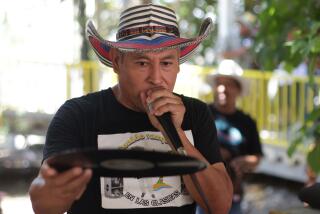Filling Societies With Informers Won’t Stop Terror
- Share via
Something new and disturbing is taking place in a nation where disturbing news is tragically common. The government of Colombian President Alvaro Uribe has instituted a national program called “Reward Mondays.” Every Monday, Colombians who provided authorities with information that helped prevent acts of violence the previous week go to the local town hall, military post or police precinct to collect their reward. They are members of Uribe’s new army of informants, part of the president’s plan to help bring an end to decades of relentless bloodshed.
After just a few weeks, Uribe’s government has handed out millions of pesos--tens of thousands of dollars--to people who reportedly provided information about dozens of unspecified operations by leftist guerrillas, right-wing paramilitaries and common criminals.
As the United States has its first unsettling experiences with citizens reporting suspicious activities, such as the case of the three medical students allegedly overheard in a Georgia restaurant making remarks about possible terrorist violence, Colombia is offering an example of the wrong way to involve the public in the war against terrorism.
Although citizens must and should report suspicious acts, civilian participation in the war on terror could end up tearing the fabric of society.
Uribe, who was elected with a powerful popular mandate to end the nation’s 38-year guerrilla war, is keeping one of his campaign promises: to develop a network of as many as a million informants to help the army’s cause. Civilians make up an integral part of Colombia’s many-sided war and have become the frequent targets of paramilitary forces and guerrilla groups, who routinely go after civilians who they claim have provided aid and comfort to their enemies.
The urgent need is to protect civilians, not to provide more reasons for the combatants to target them.
Last year some 4,000 civilians were killed and an additional 3,000 were kidnapped. In the last decade, at least 30,000 noncombatants have been killed. Uribe has survived four assassination attempts, and his father was murdered by guerrillas.
In a country with such a blood-soaked history, with no shortage of grudges and feuds, offering money to anonymous tipsters provides the perfect vehicle for personal revenge.
Just ask the people of the old Soviet Union and its former communist satellites. Millions of them lived in a world where snitching was a way of life. Neighbors were spying on neighbors, relatives telling on relatives.
Colombia is far from that, and the U.S. has not yet entered the danger zone. But both countries are trying to utilize the public to stop terror. Atty. Gen. John Ashcroft raised the ire of concerned Americans with a plan to enlist a million mail carriers, cable installers and others to spy on the rest of us.
In Colombia, the mayor of Bogota, Antanas Mockus, announced that the capital city would not join in Reward Mondays. Mockus said the plan was a bad idea that would make civilians even more vulnerable.
Besides, he pointed out, good citizens don’t need money to do their duty. “Every citizen,” he said, “has the constitutional, moral and patriotic responsibility to contact authorities if he has information that a crime will be committed.”
Terrorism poses heart-wrenching dilemmas for the societies it attacks. The question is how to best use the vigilance of the public without spawning vigilantism or opening the gates to the most destructive forms of prejudice. The answer is definitely not a system like Reward Mondays.
The answer lies in providing more information to the public about what sorts of signs we should look for.
A certain degree of profiling--ethnic or otherwise--will come into play, but we should learn to go well beyond that. Seeing swarthy, bearded men is not reason enough to call the police. In Israel, where citizens have foiled scores of terrorist attacks, the police have offered guidelines on how to spot terrorists.
Handing all citizens the ability to sic the police on anyone they please would overwhelm the police and could leave us with a different kind of country, one not much worth defending.
*
Frida Ghitis’ latest book is “The End of Revolution: A Changing World in the Age of Live Television” (Algora Publishing, 2001).
More to Read
Sign up for Essential California
The most important California stories and recommendations in your inbox every morning.
You may occasionally receive promotional content from the Los Angeles Times.










